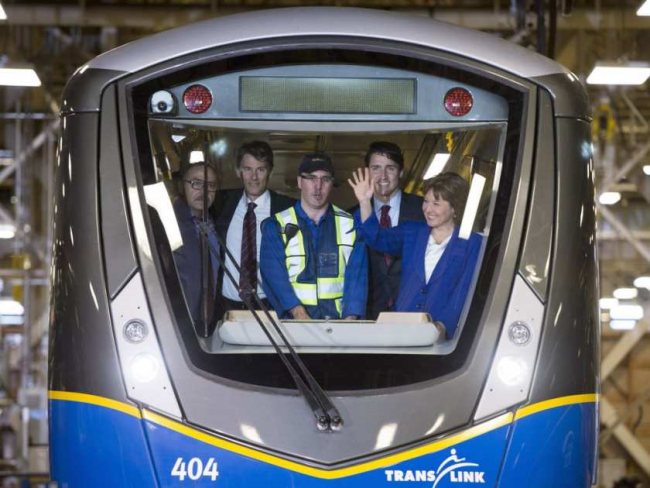Articles Menu

Metro Vancouver’s transportation funding stalemate ended Thursday with an agreement between three levels of government that will pour millions of dollars into capital funding for the first phase of the $7.5 billion, 10-year plan.
The deal, announced in Burnaby by Prime Minister Justin Trudeau, B.C. Premier Christy Clark and Vancouver Mayor Gregor Robertson, will see a total of $740 million put toward capital funding projects identified within the first two to three years of plan, including the purchase of dozens of new SkyTrain cars for all three lines, a new SeaBus and station upgrades.
In addition, an estimated $157 million of the money will be used to begin the planning and design for Surrey’s light rapid transit project and Vancouver’s Broadway subway expansion. The funds will also translate into five new rail cars for the West Coast Express and the new secure bike parking facilities at stations throughout the region.
In signing the deal, Metro Vancouver became the first jurisdiction in Canada to secure funding from the federal government’s Public Transit Infrastructure Fund, which was a major plank of the government’s 2016 budget. In total, Ottawa committed $370 million to the plan with the province and TransLink, pitching in $246 million and $125 million, respectively.
“It’s good news that I know British Columbians have been waiting for,” said Trudeau. “Because you’ve seen, you’ve experienced first-hand what happens when investments like the one we are announcing today aren’t made. What happens is you sit, for hours, in traffic, waiting to get to work, or back home after a long day.”
The tripartite agreement marks a positive step forward following years of haggling between regional mayors and the provincial government over how to fund the transportation system. The last major investment was the $1.4-billion Evergreen line, an 11-kilometre SkyTrain line connecting Burnaby and Coquitlam, which is scheduled to open next year after major delays.
This was funded by the provincial and federal governments as well as a two-per-cent increase in the gas tax. On Thursday, reporters were told that TransLink’s $125 million contribution was to come from the sale of surplus properties. TransLink later confirmed that the former transit centre on Oak Street is the only property for sale.
Yet funding for the next stage of the project remains a sticking point.
While the province and federal government remain committed to supporting the plan — Trudeau said Thursday that discussions around stage two funding for transit investment projects are already underway — phase two of the mayors’ plan hinges on the approval by the provincial government for controversial funding measures such as mobility pricing.
The mayors have also put on the table fare increases, raising property taxes, developer fees for high-density areas on transit lines and reallocation of carbon tax money as possible sources of funding. Besides capital, the mayors are responsible for operating the system once it is in place.
On Thursday, Peter Fassbender, the minister responsible for TransLink, reiterated the province’s commitment to funding a third of major projects identified in phase two of the plan and it remains up to the mayors to come up with their 17 per cent. He categorically ruled out anything involving reallocation of the carbon tax.
“I know that the TransLink board and the mayors council are working together to look at what they have within their existing funding envelopes, and it will take a bit of time, I know, for them to look into all of that, but we are committed … to sit down with all the parties to start working through that,” said Fassbender.
Clark said the new funding will help fight climate change in the region and Robertson said Ottawa’s investment “makes sense” given “we contribute about half of our tax dollars to the federal government.” He said the Broadway subway line in Vancouver and a rapid transit project in Surrey are expected to break ground within 18 months.
The announcement came a day after a Senate committee warned that none of the $6.8 billion in infrastructure money promised to cities and provinces for transit, green and social infrastructure had flowed because of a lack of funding agreements.
Last spring, Metro Vancouver residents voted down a proposed sales tax to pay for the transit plan.
Above photo: JONATHAN HAYWARD / THE CANADIAN PRESS